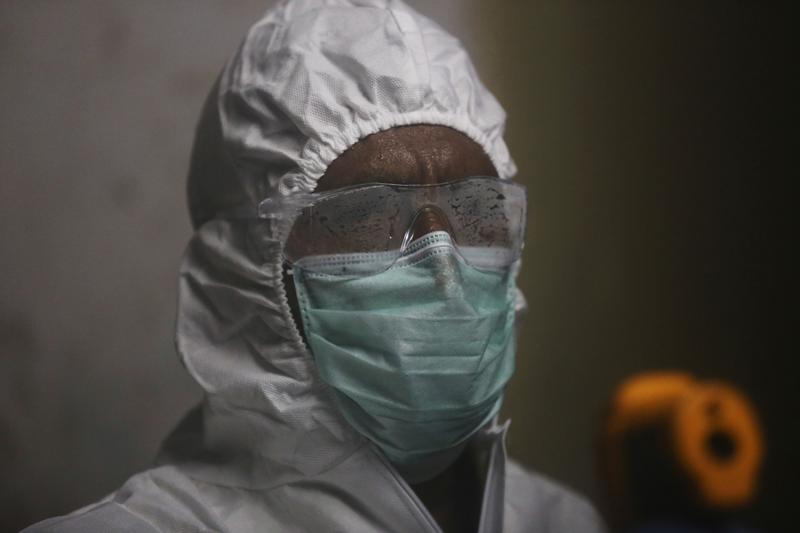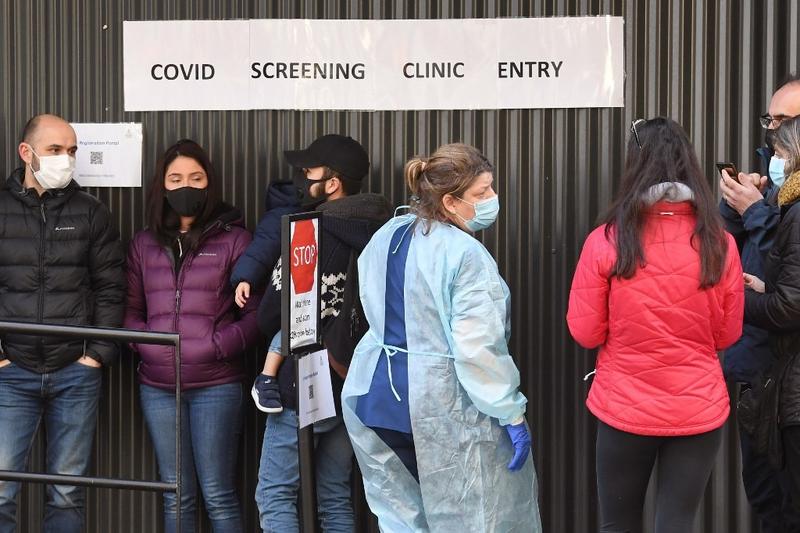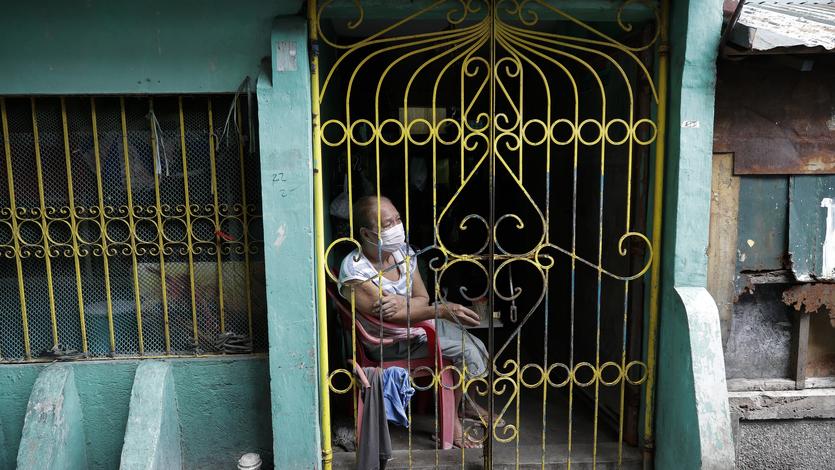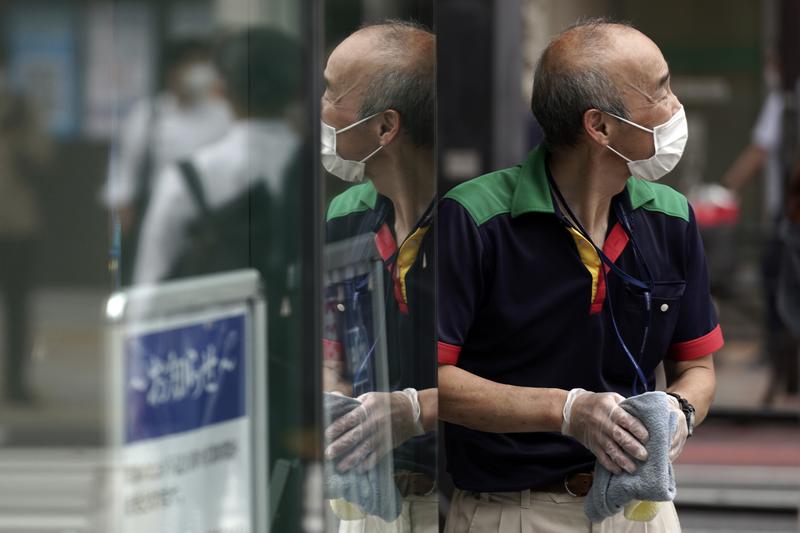
A health worker screens people for COVID-19 symptoms at residential building in Dharavi, one of Asia's largest slums, in Mumbai, India, July 17, 2020. (RAFIQ MAQBOOL / AP)
SYDNEY / CAIRO / MUMBAI / TOKYO / JERUSALEM / BANGKOK / KATHMANDU / WELLINGTON / PHNOM PENH / SEOUL / ULAN BATOR - India saw its coronavirus cases exceed 1 million, becoming the third country to cross that mark, as the novel pathogen continues to spread rapidly in the world’s second most-populous nation.
The south Asian country added 34,956 cases Friday taking the total tally to 1,003,832, according to data shared by India’s health ministry. It’s only trailing the US and Brazil now, which have 3.6 million and 2 million infections respectively, data compiled by Johns Hopkins University show.
With 1.3 billion people, India’s population is more than double of these two countries combined and is squeezed into a smaller land mass, implying the virus has plenty more room to run. Though India imposed the world’s most-expansive lockdown in the end of March with fewer than 1,000 cases, it could not suppress the viral transmission. As the economy nosedived, the government eased distancing measures causing the cases to spike.
Now senior members of Prime Minister Narendra Modi’s government have begun telling citizens they must “live with the virus” as they focus on India’s relatively low fatality rate as a marker of success, and try to build capacity to catch sick people early and treat them.
India has seen 25,602 deaths so far due to the novel coronavirus, according to the health ministry.
ALSO READ: India's COVID-19 cases surpass 800,000, total deaths at 22,123
Kuwait
Kuwait on Friday reported 553 new COVID-19 cases and two more deaths, raising the tally of infections to 58,221 and the death toll to 404, the Health Ministry said in a statement.
Currently, 9,436 patients are receiving treatment, including 143 in ICU, the statement added.
The ministry also announced the recovery of 836 more patients, raising the total recoveries in the country to 48,381.
Iran
Iran's confirmed novel coronavirus cases rose to 269,440 on Friday after an overnight registration of 2,379 new infections, according to official IRNA news agency.
During her daily briefing, Sima Sadat Lari, the spokeswoman for Iran's Ministry of Health and Medical Education, said out of the new cases in the past 24 hours, 1,852 were hospitalized.
The pandemic has so far claimed the lives of 13,791 Iranians, up by 183 in the past 24 hours, she said.
Afghanistan
Afghanistan reported 159 newly confirmed COVID-19 cases on Friday, taking the total to 35,229, the country's Ministry of Public Health confirmed.
The ministry said in a statement that 572 tests were conducted in 12 of the country's 34 provinces.
Up to 1,147 deaths have been recorded since the outbreak of the pandemic in February, with an increase of 32 over the past 24 hours.
Bangladesh
The COVID-19 cases in Bangladesh rose closer to the 200,000-mark on Friday, as the death toll surpassed 2,500.
"A total of 3,034 fresh COVID-19 cases were reported in the last 24 hours, taking the nationwide tally to 199,357," Senior Health Ministry official Nasima Sultana said in a briefing Friday afternoon.
According to the official, 13,460 samples were tested in the last 24 hours in labs across the country.
She said, "51 deaths were reported in the last 24 hours across Bangladesh and total fatalities stood at 2,547."
Fiji
The Fijian government announced Friday night a 2 billion Fijian dollars (about 926.6 million U.S. dollars) stimulus package to help the island nation battle the impact of COVID-19.
 A medical worker (center) speaks to people queueing outside a COVID-19 coronavirus testing venue at The Royal Melbourne Hospital in Melbourne on July 16, 2020. (WILLIAM WEST / AFP)
A medical worker (center) speaks to people queueing outside a COVID-19 coronavirus testing venue at The Royal Melbourne Hospital in Melbourne on July 16, 2020. (WILLIAM WEST / AFP)
Australia
Australia’s most populous state is reimposing restrictions on cafes and restaurants in fear of undetected community spread after Melbourne recorded its second consecutive record daily spike.
All indoor hospitality venues will be limited to bookings of a maximum 10 people and restricted to 1 person per four-square-meters from July 24, New South Wales Premier Gladys Berejiklian said. Weddings and other functions will also be limited to 150 guests who must remain seated and not sing, dance or mingle, she told reporters Friday.
While the state recorded just eight new cases in the 24-hours to 8pm Thursday, the restrictions are a bid to keep Australia’s largest city out of lockdown amid fears the second wave of infections in Melbourne has now spread to Sydney. A cluster of cases in Sydney’s west earlier this week were linked to a traveler from Melbourne.
Melbourne was placed into lockdown last week after after health authorities identified breaches in hotel quarantine procedures as the catalyst for outbreaks which spread through large families within multicultural communities, triggering a second-wave of infections.
The wave in Victoria state is verging on being out of control after recording 428 new virus cases Friday, the second consecutive record daily spike. It’s pushed the state’s confirmed cases to 5,165, almost half of which were recorded since the movement restrictions were reinstated, according to data compiled by Bloomberg.
Australia has surpassed 11,000 confirmed cases of COVID-19 on Friday as the nation's death toll continues to grow.
The findings stoked expectations Victoria will be forced to implement tougher restrictions on its residents, which in turn will damage Australia’s national economy.
Cambodia
Cambodia on Friday confirmed five new COVID-19 cases including two US diplomats, raising the total number of infections in the kingdom to 171, according to the Health Ministry.
The new cases included two U.S. senior diplomats and three Cambodians, the statement said.
Malaysia
Malaysia reported 18 new COVID-19 infections, bringing the national total to 8,755, the country's Health Ministry said on Friday.
Health Ministry Director-General Noor Hisham Abdullah said in a statement that 10 of the cases are imported and eight are local transmissions.
The new cases include four new case clusters, with two of them tracing to returnees from abroad who tested negative upon arrival but showed symptoms later, one at a medical center in the northern Borneo state of Sarawak and one more involving a sailor on ship with travel history.
 A resident sits inside her home during the start of a lockdown due to a rise in COVID-19 cases in the city of Navotas, Manila, Philippines, July 16, 2020. (AARON FAVILA / AP)
A resident sits inside her home during the start of a lockdown due to a rise in COVID-19 cases in the city of Navotas, Manila, Philippines, July 16, 2020. (AARON FAVILA / AP)
The Philippines
The Philippines will allow the entry of foreign nationals with long-term visas into the country from August 1, the presidential spokesman said on Friday, as the country gradually relaxes some coronavirus restrictions in a bid to support the economy.
Foreigners with valid and existing visas would need to undergo quarantine upon arrival, said Harry Roque, spokesman for President Rodrigo Duterte.
Long-term visa holders refer to foreigners living and working in the country, Roque told Reuters.
Applications for new entry visas will not be accepted and returning Filipinos will have priority on inbound flights given existing caps on airport capacity, the task force said.
The Philippine capital will remain under loose movement restrictions starting July 16, but may return to lockdown in two weeks if coronavirus cases continue to rise.
Metro Manila will stay under general community quarantine until the end of July, allowing most businesses to remain open, presidential spokesman Harry Roquesaid at a televised briefing. The health department on Thursday said the nation added 2,498 cases, bringing total infections to 61,266 while deaths rose by 29 to 1,643.
Philippine transport authorities have prohibited chatting on Metro Manila trains as an added measure to prevent the further spread of the coronavirus, a spokesperson for the Light Rail Transit Authority (LRTA) said on Friday.
Coronavirus cases in the Philippines have more than tripled since stay-home orders in the capital were lifted and most businesses were allowed to reopen starting June. The Philippines has the second-highest number of infections in Southeast Asia, next to Indonesia.
Indonesia
Indonesia’s capital will remain under social-distancing measures for two more weeks after new coronavirus cases surged since the easing of a partial lockdown a month ago.
The transition period to completely exit a so-called large scale social distancing rules to contain the virus will be extended to July 30, Governor Anies Baswedan said in a message posted on YouTube. The city, which last month allowed offices, places of worship, restaurants and shopping malls to reopen in phases with some limits, was set to lift the remaining restrictions on Friday.
Jakarta, home to more than 10 million people, has remained one of Indonesia’s virus hotspots with the gradual easing of social distancing rules allowing most economic activities to resume, fueling a surge in infections. The continuation of curbs may hit a nascent recovery in Southeast Asia’s largest economy.
Iraq
Iraq will reopen its airports for scheduled international traffic on July 23, the Higher Committee for Health and Public Safety said on Thursday, after suspending regular commercial flights in March because of the novel coronavirus outbreak.
The country will lift a nationwide night-time curfew after the Muslim holiday of Eid Al-Adha and reopen restaurants and malls as long as they implement preventative health and social distancing measures, the committee added in a statement.
It did not provide further details on flights. Some international flights have left Baghdad in recent weeks with passengers needing prior approval to travel.
In Iraq, the Health Ministry reported 2,281 new COVID-19 cases, bringing the total number of infections to 86,148, and 90 more deaths, raising the death toll to 3,522.
Israel
Israel imposed a new weekend shutdown on Friday and tightened a series of coronavirus curbs to lower infection rates, amid growing public anger over the government’s handling of the crisis.
People would be allowed to leave their homes this weekend but malls, shops, pools, zoos and museums would shut from Friday afternoon until Sunday morning, the government said in a statement.
Full weekend lockdowns that could confine people to their homes may be imposed by July 24, after the government gains parliamentary approval for that, Israel Radio reported. Weekends in Israel begin on Friday afternoon, the eve of the Jewish Sabbath, and last until Sunday - a working day.
On all days, gatherings will be limited to 10 people indoors and 20 outdoors and restaurants would be allowed to serve take-out only, the government said. A further decision on whether to keep summer schools and nurseries open would be made by Prime Minister Benjamin Netanyahu and Defence Minister Benny Gantz.
The number of active COVID-19 cases in Israel rose to 25,305 on Thursday, the highest since the outbreak of pandemic in late February, according to the state's Ministry of Health.
Meanwhile, the total number of COVID-19 cases climbed to 46,059 after the addition of 1,871 new cases, the second highest daily rise since the outbreak, the ministry's data showed.
The death toll from the disease increased from 376 to 384, while the number of patients in serious condition decreased from 204 to 202, out of 542 patients currently hospitalized.
The number of recoveries reached 20,370, with 381 new recoveries.
 An employee wearing a face mask to help curb the spread of the coronavirus cleans windows of a shop, July 16, 2020, in Tokyo. (EUGENE HOSHIKO / AP)
An employee wearing a face mask to help curb the spread of the coronavirus cleans windows of a shop, July 16, 2020, in Tokyo. (EUGENE HOSHIKO / AP)
Japan
The Japanese government is facing potentially damaging blowback after excluding Tokyo residents from a multibillion dollar campaign aimed at reviving domestic tourism, even as the capital on Friday reported a record number of new COVID-19 cases.
Prime Minister Shinzo Abe’s US$16 billion “Go To” tourism campaign was intended to promote travel across the country, but officials agreed on Thursday to exclude Tokyo because of the resurgence in infections there.
Tokyo Governor Yuriko Koike reported 293 new cases on Friday, a fresh daily record after the city recorded 286 cases a day earlier.
Abe has borne the brunt of the negative reaction to Tokyo’s exclusion from the travel subsidy programme, adding to growing criticisms of his handling of the crisis that analysts said could erode his support.
Japan has reported a total of around 23,000 cases, including nearly 1,000 deaths.
Top government spokesman Yoshihide Suga said Tokyo could be still be included in the travel subsidy programme if infection numbers recede, but also cautioned its exclusion from the dining out subsidies and others was “under consideration”.
Lebanon
Lebanon's number of COVID-19 infections increased on Thursday by 57 cases to 2,599, while the death toll went up by two to 40.
Mongolia
Mongolia has reported one more COVID-19 case in the last 24 hours, bringing the nationwide tally to 262, according to the National Center for Communicable Diseases (NCCD).
The latest case is an 18-year-old Mongolian man who returned home from abroad on a chartered flight on Wednesday, the NCCD said Friday in a statement.
In addition, two more patients have recovered from the disease, bringing the total number of recoveries in the country to 211, it said.
Nepal
The Nepali government planned to lift the ongoing suspension on domestic and international flights starting from August as the Himalayan country has seen a drop in new COVID-19 cases, said a senior official of Nepal's Ministry of Culture, Tourism and Civil Aviation.
The COVID-19 Crisis Management Centre headed by Nepali Deputy Prime Minister and Defense Minister Ishwar Pokharel was formed to coordinate efforts against the pandemic. Based on the recommendation of this center, the cabinet will decide whether to lift the suspension of flights.
Both domestic and international flights have remained suspended in Nepal since March 22, except chartered flights for humanitarian purpose or delivery of medical goods.
Nepal on Thursday reported 167 new COVID-19 cases in a day, a sharp drop from the record high 740 cases on July 3 as the total cases stood at 17,344. "We believe that flights can be operated by adopting strict health protocols."
Nepali tourism entrepreneurs have also demanded to reopen the tourism sector by lifting flight cancellation as the sector faces huge losses due to the pandemic.
New Zealand
New Zealand reported one new case of COVID-19, who was in managed isolation facilities, according to the Ministry of Health on Friday.
It has been 77 days since the last case of COVID-19 was reported locally from an unknown source.
Friday's case was a man in his 30s who arrived in New Zealand on July 10 from Pakistan via Dubai.
Seven more patients have recovered, bringing down the number of active cases in New Zealand to 21, the statement said. The total number of confirmed cases was 1,199, with 22 COVID-19 related deaths, and there is no one receiving hospital-level care.
The health ministry also changed the clinical criteria for recovery from COVID-19 in New Zealand, which includes ensuring alignment with Australian counterparts.
Oman
Oman on Thursday reported 1,327 new COVID-19 cases, bringing the total infections to 62,574, the Ministry of Health said.
It reported nine new deaths from the virus, raising the death toll in the country to 290, and 1,052 new recoveries, increasing the total recoveries to 40,090.
Qatar
Qatar's Health Ministry on Thursday announced 494 new infections of COVID-19, increasing the total number of confirmed cases in the Gulf state to 105,477.
One more death was recorded, taking the total fatalities to 152, while the tally of recoveries rose to 102,168 after 531 more people recovered during the past day.
READ MORE: Japan's domestic tourism campaign faces scrutiny as virus spikes
South Korea
South Korea on Friday approved an early stage clinical trial of Celltrion Inc’s experimental COVID-19 treatment drug, making it the country’s first such antibody drug to be tested on humans.
South Korea reported 60 more cases of the COVID-19 as of 0:00 am Friday local time compared to 24 hours ago, raising the total number of infections to 13,672.
The daily caseload stayed around 60 for two straight days due to the continued small cluster infections and imported cases.
Of the new cases, 39 were imported from overseas, lifting the combined figure to 2,005. It continued to increase in double digits for 22 days in a row.
Two more deaths were confirmed, leaving the death toll at 293. The total fatality rate stood at 2.14 percent.
Saudi Arabia
Saudi Arabia's total coronavirus cases rose to 243,238 on Thursday with the registration of 2,764 new cases, the Saudi Health Ministry tweeted.
The death toll in the kingdom climbed to 2,370 with 45 new fatalities during the last 24 hours, while the tally of recoveries rose to 187,622 after 4,574 patients newly recovered from the disease.
Thailand
Thailand on Friday said it would give foreigners a grace period until September to apply for visa extensions as it eased restrictions amid the pandemic, a senior official said.
Thailand has granted foreigners automatic visa extensions twice so far to prevent long queues at immigration.
The country has gone seven weeks without confirmed local transmission. It has reported 3,239 infections and 58 deaths.
Turkey
Turkey reported 933 new COVID-19 infections, bringing the tally of confirmed cases to 216,873, and 21 new deaths from the virus, pushing the death toll to 5,440.


